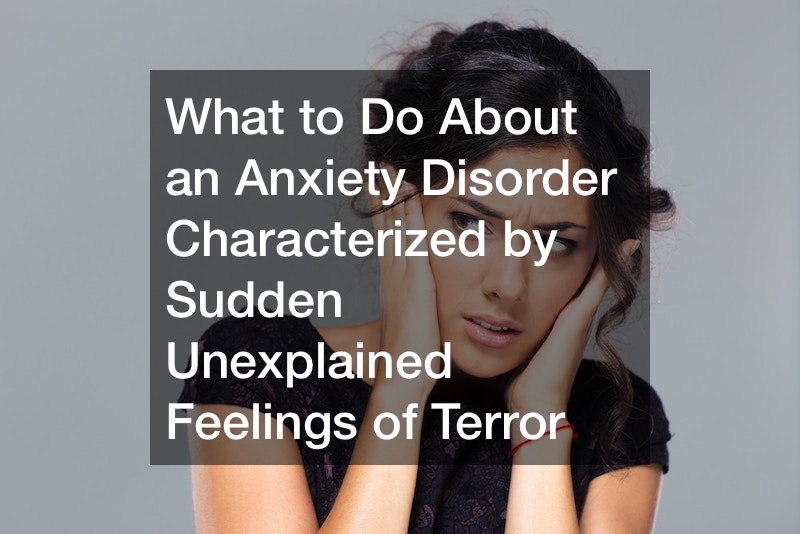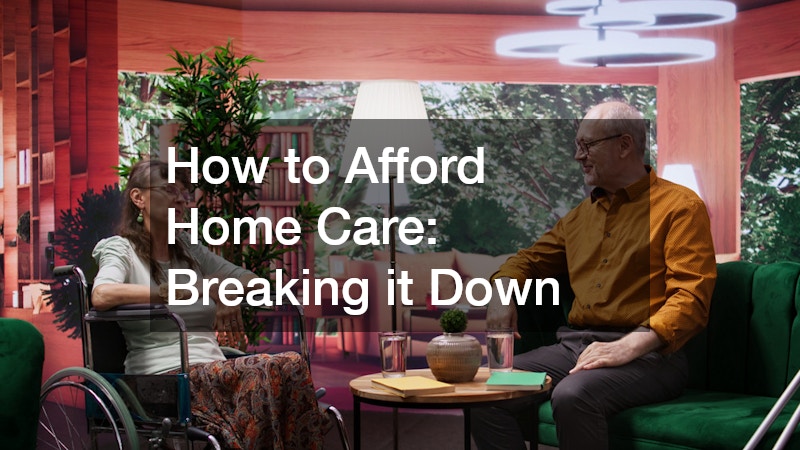
Have you ever experienced a sudden, intense anxiety or dread that seems to come from nowhere? If so, you might have a panic condition, an anxiety disorder characterized by sudden unexplained feelings of terror. Millions of people worldwide have panic disorder, which can be severely debilitating if untreated. But you can control this illness and lessen how much of an influence it has on your life.
In this article, we’ll look at a few choices you might want to consider if you have panic attacks. From hiring extra help around the house to looking into alternative resources, we’ll provide you with practical solutions that can help you regain control over your life and mental health. Read on to learn more.
1. Hire Extra Help Around the House

Dealing with panic and anxiety attacks can be exhausting and emotionally taxing. One way to get around this problem is to hire additional domestic help. It frees up your time so you can concentrate on your mental health. According to the National Institute of Health, parents who dedicate more time to home duties experience higher stress levels and dissatisfaction with family life. Suggestively, outsourcing household tasks may benefit family dynamics and mental wellness.
Hiring a daycare service to help with childcare can also be a game-changer for parents with panic disorder. It makes balancing job and parenting commitments easier and can free up parents to take much-needed breaks for their mental health. In fact, high-quality daycare may have favorable long-term benefits for children’s cognitive and social development, according to a recent study by the NCBI.
2. Get an Examination
Seek expert medical assistance if you suddenly experience unpleasant feelings you can’t explain. A thorough checkup from a licensed healthcare professional is crucial because panic disorder might be misinterpreted as other medical issues. According to the Anxiety and Depression Association of America, around 2-3% of Americans have panic disorder, which is more common in women than in men. But only a few people with panic disorder seek medical assistance, making misdiagnoses or neglect of treatment common.
A thorough examination might assist in identifying any underlying medical issues that might be causing the symptoms of panic disorder. For instance, you might require cancer treatment services if cancer is the root of your symptoms. A checkup helps find and treat underlying medical concerns and gives you confidence that nothing major is wrong with your health.
3. Look Into Orthodontic Treatment

Orthodontic care – such as braces – might not be the first thing that springs to your mind when thinking of treatments for panic disorder. But, orthodontic care can assist in reducing the symptoms of panic disorder. Anxiety and stress frequently manifest as teeth grinding or bruxism, which you can treat with orthodontics. A Bruxism Association study found that bruxism affects 10% of the population on average and is more prevalent in those who suffer from anxiety disorder characterized by sudden unexplained feelings of terror.
Braces treatment can help straighten the teeth and jaw and help relieve the stress and strain that might cause bruxism. Moreover, straighter teeth might lessen social anxiety, and boost general well-being and self-confidence. An American Association of Orthodontists poll shows 75% of adults with crooked teeth reported feeling self-conscious after straightening, while 92% opine having a beautiful smile was a necessary social attribute. Besides straighter teeth, orthodontic therapy might have other advantages. As a result, receiving orthodontic treatment can enhance oral and general mental health.
4. Go to a Spa
Visiting a spa might seem more like a luxury than a panic disorder treatment. Yet, studies show that massage therapy, which spas usually provide, might lessen stress and anxiety disorders characterized by sudden unexplained feelings of terror symptoms. Research by the American Massage Therapy Association found that massage therapy can reduce cortisol, a stress hormone, by up to 30%.
Massage therapy stimulates the release of endorphins, natural painkillers, and mood enhancers. This can encourage relaxation and lessen emotions of stress and anxiety disorder characterized by sudden unexplained feelings of terror. A further benefit of massage therapy is enhancing the quality of sleep, which is crucial for managing panic disorder. Some spas also offer relaxation therapies, like hydrotherapy and aromatherapy, beneficial to people with panic disorder.
Here is an interesting point. Essential oils, used in aromatherapy, have been found to ease anxiety disorders characterized by sudden unexplained feelings of terror and encourage relaxation. Hydrotherapy uses water to induce rest, enhance circulation, and lessen pain and inflammation.
5. Consider Supplements

Supplements, in addition to dietary adjustments and therapy, may be beneficial in managing panic disorder. However, only some supplements will get the job done. Here are some options you should consider.
- Omega-3 Fatty Acids: Fish, nuts, and seeds all contain omega-3 fatty acids, a healthy fat. Omega-3 supplements may relieve anxiety symptoms in people with mood disorders. They regulate neurotransmitters in the brain associated with anxiety disorders characterized by sudden unexplained feelings of terror.
- Magnesium: Magnesium is a mineral necessary for various body processes, including muscle coordination and nerve transmission. It might also assist in controlling anxiety. Taking magnesium supplements helps those with generalized anxiety disorder feel less anxious.
- Ashwagandha: The herb ashwagandha, frequently used in Ayurveda medicine, is said to have stress-relieving qualities. According to a randomized, double-blind, placebo-controlled trial published in the Journal of Clinical Psychiatry, using ashwagandha supplements helped people with generalized anxiety disorder characterized by sudden unexplained feelings of terror feel less anxious.
- L-Theanine: Research has revealed that the amino acid L-Theanine, present in green tea, has a soothing impact on the body. It raises levels of GABA and serotonin, two neurotransmitters that aid in relaxation. L-theanine supplements come in powder or capsule form.
- Rhodiola Rosea: This adaptogenic plant aids the body in coping with stress. It has long been used to alleviate anxiety disorder characterized by sudden unexplained feelings of terror and depression in herbal medicine. There are tablet and capsule supplements for Rhodiola Rosea. However, it is important to keep in mind that Rhodiola Rosea may interfere with some drugs, so you should consult a doctor before taking this supplement.
If you feel anxious, go for some supplements. While supplements may prove beneficial, you should refrain from using them in place of treatment or medication. The best course of action is to consult a healthcare professional before starting an unfamiliar supplement regimen.
6. Go to a Chiropractor
Chiropractic practice deals with the manipulation of the spinal using controlled force. It helps enhance physical function and alleviate body pain. An experienced chiropractor can help people with panic disorder, particularly those suffering from lower back pain. Lower back pain is a common manifestation of anxiety and stress. The American Chiropractic Association estimates that 31 million Americans suffer from lower back pain, which is more prevalent in people suffering from depression and anxiety.
Chiropractors adjust the spine and other body joints using gentle techniques, which can ease pain and tension. Better circulation is another benefit of chiropractic care, which is crucial for treating panic disorder. Don’t hesitate to consult a chiropractor to explore your options and improve your well-being.
7. Look Into Alternative Resources

Various resources are accessible for those who favor alternate methods of managing their panic disorder. One of these is medical marijuana, which has been shown to reduce anxiety problems. In recent years, there has been a surge in medical cannabis marketing, which has made the product more accessible to people who are interested in exploring this option. According to ScienceDirect, medical cannabis reduces anxiety and depression symptoms in PTSD patients by up to 50%.
Mindfulness-based therapies, which have proven successful in treating anxiety disorders, are another option. The practice of mindfulness is being present in the moment and accepting one’s thoughts and feelings without passing judgment. Other beneficial alternatives for managing panic disorder are yoga and meditation. These techniques encourage calmness and ease tension and stress, which is crucial for controlling panic disorder symptoms. According to NCBI, practicing yoga for 12 weeks helps persons with panic disorder feel less anxious and depressed.
8. Avoid Caffeine and Alcohol
Another effective way to manage panic disorder is avoiding alcohol and caffeine. Caffeine and alcohol can potentially worsen anxiety symptoms and start panic attacks. Let’s take a closer look at how alcohol and coffee may affect anxiety.
Caffeine
Caffeine is a stimulant that can raise blood pressure and heart rate, leading to anxiety symptoms, including racing thoughts and palpitations. It may even cause panic episodes in some people. Caffeine has varied effects on different people. Thus, some people with panic disorder may be more sensitive to its effects than others. Some caffeine-containing products include tea, soda, energy drinks, and pharmaceuticals.
Alcohol
Alcohol can initially soothe the body because it is a depressant. However, alcohol can cause rebound anxiety when it wears off, aggravating the symptoms of panic disorder. It might also make it difficult to sleep, which makes anxiety worse. Therefore, it is essential to remember that although alcohol temporarily relieves anxiety, liquor can increase the symptoms over time. Therefore, cutting back on consumption gradually or getting treatment from a doctor or therapist to create coping mechanisms for cravings and withdrawal symptoms is beneficial.
9. Become Responsible for a Pet
Caring for a pet can be a great stress reliever for people with panic disorder and anxiety disorder characterized by sudden unexplained feelings of terror. The National Institute of Health found that spending time with pets might lower anxiety and improve mood. Dogs offer companionship and can help individuals create routines, both of which help control the symptoms of panic disorder.
In addition to the companionship advantages, having a pet entails routine checkups and treatment at veterinary medical services, which can support a healthy and active lifestyle for both the owner and the pet. Those with panic disorder have been observed to experience fewer symptoms of anxiety while around dogs, in particular. According to another research by Nature Journal, dog owners reported feeling more content and less anxious than those who did not. Dogs can also give patients with panic disorder a sense of protection and security, which can be comforting.
However, before choosing this route, it’s important to think about the responsibilities that come with pet ownership. Keeping a pet requires time, effort, and money, which can be difficult for persons with panic disorder who may find it difficult to complete daily duties. You will also need to take the flurry friend to hospitals for regular check-ups. Ensure you pick a pet that fits your needs and lifestyle.
10. Try a New Diet
Nutrition is crucial in treating anxiety disorder characterized by sudden unexplained feelings of terror. A healthy, balanced diet is a weight loss help that can lessen anxiety symptoms since certain foods and nutrients can impact brain health and mood. A diet high in fruits, vegetables, whole grains, seafood, and lean protein improves mood and reduces anxiety. Sugar and fatty food will not only exacerbate the anxiety problem but are also bad for appendicitis.
For instance, people with panic disorder may benefit from a low-carb or ketogenic diet, which can help control blood sugar and lessen inflammation. Following a plant-based or Mediterranean diet, which is high in antioxidants and good fats, can also be helpful. However, no one diet works for everyone when treating panic disorder. Therefore, it’s crucial to find a diet that suits you by seeing a healthcare professional or certified dietitian. Additionally, it’s essential to ensure that any dietary modifications are implemented sustainably and safely.
In conclusion, treating panic disorder is a complex process that requires various strategies. While there is no one-size-fits-all remedy, the methods mentioned above, such as getting expert assistance, engaging in relaxation exercises, and altering one’s lifestyle, can all help manage symptoms. Those suffering from the abrupt, unexplainable emotions of terror that are a hallmark of panic disorder often find relief by actively controlling their illness. Remember that enhancing your general wellbeing and quality of life can be accomplished largely by seeking support and implementing healthy lifestyle choices.




